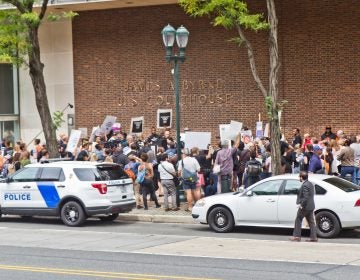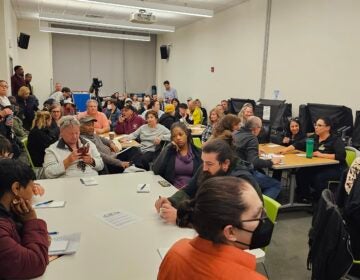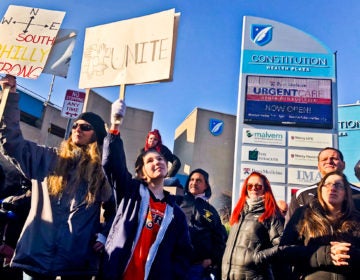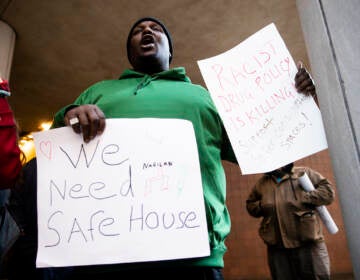After April setback, Philadelphia nonprofit Safehouse files new appeal in federal court to open overdose prevention centers
Safehouse’s appeal seeks to reverse a district court judge’s decision to dismiss the nonprofit’s case in April with the U.S. Department of Justice.
Listen 1:09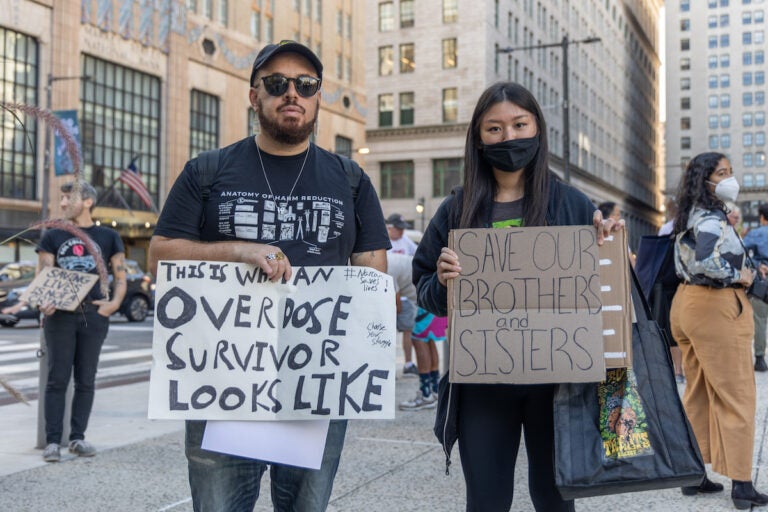
File photo: Jay Shifman (left) and Emily H. (right) protested ahead of Philadelphia council members hearing testimony to ban supervised injection sites in the city on Sept. 14, 2023. (Kimberly Paynter/WHYY)
From Philly and the Pa. suburbs to South Jersey and Delaware, what would you like WHYY News to cover? Let us know!
A group of Philadelphia community advocates, faith leaders, lawyers and public health experts have taken the next step in their pursuit of opening an overdose prevention center.
The nonprofit Safehouse filed an appeal Friday in the U.S. Court of Appeals for the 3rd Circuit. It challenges district court Judge Gerald A. McHugh’s decision in April to end the nonprofit’s case against the U.S. Department of Justice.
In April, US District Court in Philly granted DOJ motion ending 5-year lawsuit vs Safehouse and our efforts to open an Overdose Prevention Center. Last week, we filed Notice of Appeal to 3rd Circuit Court of Appeals. We’re not done yet!
— Safehouse (@SafehousePhilly) June 3, 2024
Safehouse attorneys argued that the nonprofit’s plan to open an overdose prevention center did not violate federal drug laws because it was protected on religious grounds and the First Amendment.
However, McHugh in the U.S. District Court for the Eastern District of Pennsylvania disagreed and granted the DOJ’s request to dismiss the case. It ended a chapter in a five-year legal saga that began when the Trump administration first sued to stop Safehouse from opening a site in 2019.
Safehouse’s new appeal will be heard by a three-member panel on the 3rd Circuit bench.
Overdose prevention centers, also called supervised injection or safe consumption sites, are spaces where people can use drugs under the watch of professionals who can intervene to prevent fatal overdoses.
Sites also offer sterile equipment and drug testing tools; certified peer specialist support; connections to addiction treatment and medication for opioid use disorder; wound care; testing and treatment for HIV and hepatitis; and referrals to housing, legal support and other social services.
In Philadelphia, a record 1,413 people died of drug overdoses in 2022, according to city data. Officials have not yet released overdose data for last year.
Evidence and research shows that overdose prevention centers in New York City and other countries prevent deaths, reduce public drug consumption and connect people to resources, but they face intense opposition from some lawmakers, residents and community members.
Philadelphia City Council, overriding a mayoral veto, passed a zoning overlay law last September that prohibits a “narcotic injection site” in nine of 10 city districts.
However, Safehouse leaders and advocates said that will not stop them from seeking federal approval to open a site in the city.
“Our priority is getting a federal green light to operate,” said Ronda Goldfein, Safehouse attorney and executive director of the AIDS Law Project of Pennsylvania. “The next step will be to assess siting operations in considerations of the zoning overlay.”
During a recent panel discussion in Center City, Goldfein said the actions of previous city leaders and health commissioners to bring progressive harm reduction methods like needle exchange programs to Philadelphia, in defiance of state laws, was bold, radical and visionary at the time.
She said today’s addiction crisis, fueled by fentanyl and worsened by substances like xylazine, need the same visionary actions.
“I hope we have not seen Philly’s brightest day behind us,” Goldfein said.
WHYY is your source for fact-based, in-depth journalism and information. As a nonprofit organization, we rely on financial support from readers like you. Please give today.


